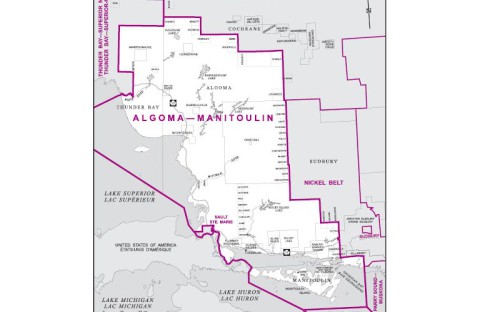To the Expositor:
A study in The Journal of Climate Change (February 2012) reports that during the years 1973 to 2010, ice coverage across the Great Lakes has diminished by 71 percent—an astounding and troubling number. Ice loss negatively impacts both water quality and marine life, not to mention cultural and recreational pursuits. This winter yielded many woeful tales, from limited (and dangerous) ice fishing to inaccessible sugar shacks. Although science makes no promises on cause and effect, it makes sense that ice loss, water levels and climate change must be related.
Always on the lookout for good ideas, the water committee of the Manitoulin Area Stewardship Council (MASC) travelled to Traverse City, Michigan this winter to attend the third annual FLOW coalition meeting. The purpose of FLOW is to “Gather around the ideal that the Great Lakes are a Commons, held in public trust.”
The notion of a “Commons” has been embraced by First Nations communities for a millennia. In her paper titled ‘Our Great Lakes Commons: A People’s Plan to Protect the Great Lakes Forever,’ Maude Barlow, chair of the Council of Canadians, defines a Commons as “… no one owns water…it is a common heritage that belongs to the Earth, other species and future generations as well as our own…it is a flow resource necessary for life and ecosystem health,…there is no substitute for it.”
Far from being a foreign venture, many Commons already exist, from public libraries to provincial parks. One of Manitoulin’s seasonal citizens, Dr. Elinor Ostrom, won the 2009 Nobel Prize in Economics for her work on Commons. Ms. Barlow notes a Commons requires “a change in the relationship of the humans who depend on the watershed from one of exploitation to one of respect. Law and practice would protect all the waters of the Great Lakes Basin, and the restoration of its ground and surface waters would be a priority.”
A public trust is the legal mechanism that allows a Commons to be respected as such. The chair of FLOW, Jim Olson, a renowned environmental lawyer, explains “The public trust is one of those rare legal principles that protect common values, in the same way the first amendment protects free speech…all the waters of the Great Lakes, connecting waters and all tributary lakes and streams (with the exception of groundwater) are subject to Public Trust law in the United States. The principles of governance, democracy, and public control already apply and exist; we, as recognized beneficiaries, need to educate and exercise.”
Happily, Ms. Barlow and Mr. Olson united for the cause. In December 2011, this dynamic duo met with the International Joint Commission (IJC) to expound the virtues of managing the Great Lakes as a Commons. You can view their presentations at http://canadians.org/blog/?p=12840. By all reports, the meeting went well, but the IJC has yet to make its comments public.
The IJC was founded in 1909 to help manage the Great Lakes and its waters. The IJC oversees the International Upper Great Lakes Study Board (IUGLSB) (the group (the Study Board) that came to Kagawong last summer). As a result of those meetings, the Study Board is scheduled to reveal their recommendations very soon. The IJC plans to holding hearings around the Great Lakes this summer and MASC has invited them to hold one here, in Little Current. If they agree, MASC will invite Ms. Barlow and Mr. Olson to attend and certainly hope the rest of Manitoulin will come too.
Keith Schneider, editor of ‘Circle of Blue,’ also spoke at the FLOW meeting. He warned of the countless demands for water facing the Great Lakes. “The collision between energy needs and water supplies will have serious implications…The massive rush for new domestic sources of energy, backed by (US) government subsidies, requires huge new sources of water. For instance, it takes 1,000 gallons of water to produce one gallon of corn ethanol, and 6,500 gallons of water to produce one gallon of biodiesel from soybeans, forms of energy promoted as fossil fuel replacements…Generating energy for “clean” alternatives is almost certain to consume much more water than the fossil fuels they are meant to replace.” Additionally, fracking for Natural Gas and Alberta Tar Sands extractions both require enormous amounts of water. From where will it come?
Therese Trainor
Kagawong



